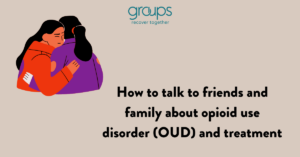
New Year’s resolutions are popular for a reason, right? A new year is a fresh start. It’s a chance to reflect on the past year and set goals for the new one. But most resolutions don’t last past the first few weeks. That’s because many people’s resolutions require major changes. For most of us, changing everything isn’t possible — and it isn’t something that anyone should have to do.
Instead of making big resolutions for the new year, we encourage our members to set smaller, more doable goals. Here’s how to do that.
1. Reflect on everything you’ve already accomplished.
When setting new goals, reflecting on what you’ve already achieved is important. It doesn’t matter how big or small your accomplishments are. Write them down and celebrate them.
If you only think about what you haven’t done instead of what you have done, that can make you feel bad about yourself. Think of new goals as adding to what you’ve already accomplished — not trying to get rid of what you consider to be “bad.” You deserve more, not less.
2. Learn how to set realistic goals.
The best goals are goals that are possible. A good model for setting realistic goals is the “SMART” model: specific, measurable, achievable, relevant, and time-bound.
When setting SMART goals, consider the following things:
- Specific: Is your goal clear? What do you want to do, and how will you get there?
- Measurable: Is your goal something you can measure? Goals like scheduling health care appointments, getting a new job, or spending an hour each week with your kids are measurable.
- Achievable: Is your goal doable? Do you have what you need to do this? While buying a mansion isn’t doable for most people, finding secure housing is.
- Relevant: How does your goal fit with your bigger goals? Why does this goal matter? Try to keep all of your goals in line with the bigger picture.
- Time-bound: Does your goal have a timeframe? Knowing when you want to achieve a goal helps you work toward it.
You can use this simple worksheet to make sure each of your goals is SMART.
3. Set goals to support your emotional well-being.
If your bigger goal is to live a happy and healthy life, your emotional well-being is a big part of that. You can set SMART goals to make sure you’re taking steps to support your mental health.
Examples of SMART goals for emotional well-being:
- Practice mindfulness for 10 minutes every day.
- Find a therapist or support group and meet with them every week.
- Get eight hours of sleep every night.
- Write down a list of family boundaries by the end of January.
4. Set goals to support your physical health.
Your physical health is also very important. Setting SMART goals for your physical health could include reminders to go to appointments, get in regular movement, and nourish your body with food.
Examples of SMART goals for physical health:
- Go to every weekly group.
- Spend 30 minutes moving in a way you enjoy every day.
- Schedule and go to your annual visit with your primary care provider.
- Eat three meals and two snacks every day.
5. Set goals to help you live the life you want.
Beyond mental and physical health, you may also have life goals you want to meet. Groups can help you make a plan and put it into action. Members work with their counselors and Recovery Support Specialists to set and check in on achievable goals every 70-90 days.
Examples of SMART goals to help you live the life you want:
- Set a weekly budget and stick to it.
- Take a class at your local library by the end of February.
- Get a new job by the end of March.
- Get a new car by the end of 2024.
Groups is here to help you meet your goals.
Groups is here to help you and your family meet goals that help you survive, grow, and thrive. As you set your SMART goals for the new year, find resources in our Groups Goal Guides:
- Groups Goal Guide: Employment
- Groups Goal Guide: Transportation
- Groups Goal Guide: Food & Nutrition
- Groups Goal Guide: Housing
- Groups Goal Guide: Health Insurance
- Groups Goal Guide: Open Enrollment
New to Groups? Groups is a leading outpatient treatment provider for opioid use disorder. Members get access to Suboxone at the right dosage for them, weekly group therapy, and personalized life goal support. Our flexible program is available online or in person and is covered by most Medicaid and insurance plans.
Call us at (888) 858-1723 any time, 365 days a year to find out if Groups is right for you.



